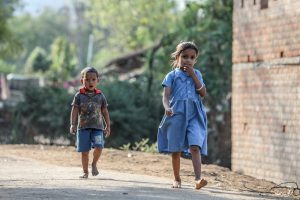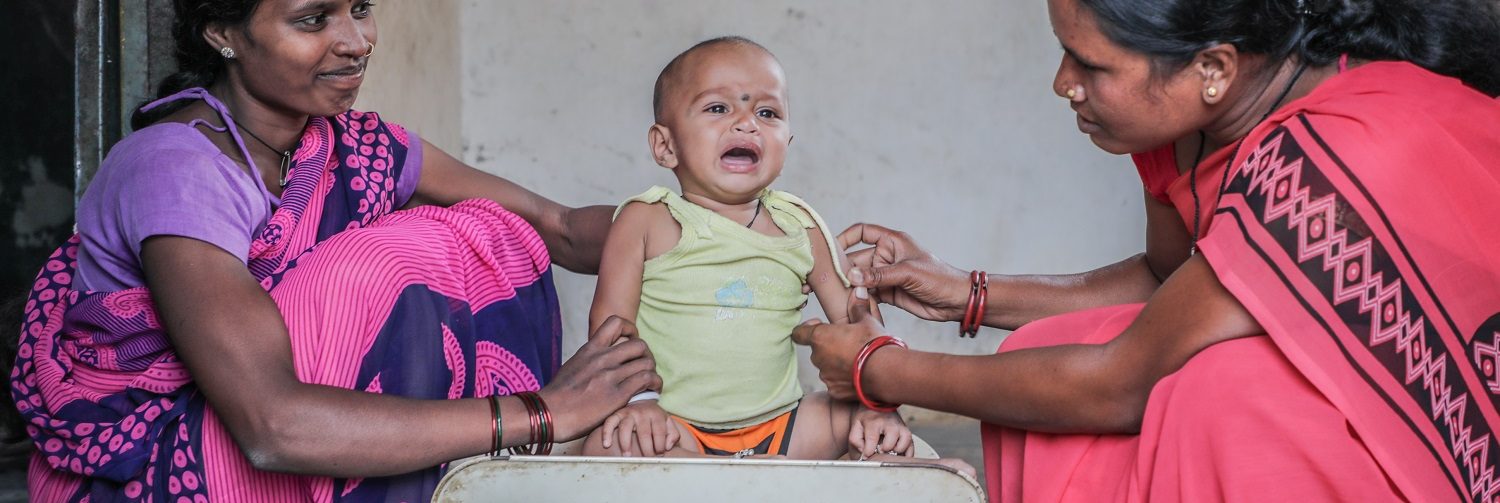India has witnessed rapid transitions in its socioeconomic, demographic, health and nutrition patterns over the last decade. While undernutrition continues to be a problem, the prevalence of overnutrition is also on the rise. No state or district in India is immune from the challenge of malnutrition - be it stunting, wasting, anemia, micronutrient deficiencies, low birthweight, underweight or overweight/obesity and nutrition-related non-communicable diseases. There is tremendous inter-district variability both in the status of nutrition outcomes and the coverage and utilization of nutrition interventions.
Sustained action is required from all quarters of society to tackle this complex challenge of malnutrition and ensure India’s progress towards the United Nations’ Sustainable Development Goals (SDGs) related to nutrition. There are multiple, interlinked factors, beyond personal decisions, that strongly influence dietary choices and patterns.
To understand these on the basis of data and evidence, and discuss the actions that are needed from across society, around 50 key nutrition stakeholders gathered at a workshop in New Delhi on 29-30 March 2019, jointly organized by the International Food Policy Research Institute and NITI Aayog. The goal was to align perspectives and co-create a common renewed nutrition vision, in line with the National Nutrition Strategy, for tackling malnutrition in India.
Prior to the workshop, through an online survey, views were collected from the wider nutrition community on India’s most pressing nutrition challenges, and suggested solutions and actions in diverse areas. At the workshop, participants reviewed the data and evidence along with stakeholder survey results, and then held in-depth discussions on addressing the cross-cutting issues for various nutrition challenges. Four areas were discussed: (1) childhood undernutrition (stunting, wasting); (2) maternal nutrition (low BMI, anemia); (3) non-communicable diseases (overweight/obesity, high sugar levels, high blood pressure) and (4) micronutrient deficiencies. The groups discussed the current policy efforts, and outlined next steps to address each of these nutrition challenges. The insights that emerged at this workshop are now available in a comprehensive report. Some of the key recommendations are below.
To address childhood undernutrition, especially issues related to stunting and wasting, the group reiterated support for a multisectoral approach and to ensure convergence of all interventions on the same child, mother, and household in the first 1000-day period. The nutrition community also needs a deeper understanding of the incidence and antecedents of wasting, which is widespread. A strong call was made for ensuring the availability of programmatic guidance for screening and management of wasting, estimating needs for nutrition rehabilitation centers (NRCs) and policy guidance on therapeutic foods to ensure rapid recuperation. Four key areas for action were recommended, with the need for a life-cycle approach. These included:
- Improving underlying determinants related to adolescent health, early marriage, women’s empowerment, poverty, food security and sanitation;
- Emphasizing infant and young child feeding practices with special attention to complementary feeding;
- Addressing the coverage of health and nutrition interventions in the first 1000 days with quality and equity; and
- Streamlining data systems to monitor progress.
On the issue of maternal malnutrition, participants recommended specific steps for monitoring nutritional status during pre-pregnancy and throughout pregnancy and establishing protocols for guidance on follow-up processes. To address maternal anemia, in particular, the recommendations included:
- Ensuring hemoglobin testing of all pregnant women and providing guidance on follow-up mechanisms;
- Adequate supply of multiple sources of micronutrients for pregnant women;
- Strengthening the compliance of private healthcare to align with government protocols for pregnancy care, including weight monitoring and haemoglobin monitoring; and
- Promoting dietary diversity through agricultural, livelihood, and social safety-net interventions.
- Addressing underlying and non-iron deficiency determinants of anemia
For addressing overweight and non-communicable diseases (NCDs) the group emphasized that in addition to addressing current challenges related to the food system, work places and other challenge, the overweight and NCD prevention agenda must be linked strongly with the undernutrition agenda. The developmental origins of adult disease in India requires an early prevention approach going all the way back to the first 1000-days of life. Some of the specific recommendations included:
- Creating an enabling policy environment to support healthy food systems, physical activity and more;
- Improving the nutritional composition of publicly financed food-based programs;
- Empowering and educating consumers; and
- Improving food environments everywhere.
To improve and strengthen actions on addressing micronutrient deficiencies in India, the key recommendations included:
- Improving availability of data on outcomes and determinants of micronutrient deficiencies, including on food consumption patterns;
- Increasing awareness generation to make better diets and better nutrition aspirational in the context of POSHAN Abhiyaan’s behavior change efforts;
- Improving policy guidance, policy coordination and monitoring of existing programs on food supplementation and fortification; and
- Investing in addressing major food systems issues to ensure diet diversity.
Overall, there was agreement on the following areas:
- Interventions for the first 1000 days are of utmost significance for all the nutrition challenges examined.
- Overweight and NCDs need urgent attention, starting early, and with actions through the life course (the first 1000 days, schools, work places, home and markets)
- Immediate determinants of poor nutrition, like diet quality and diet diversity, matter for all age groups, and need attention to achieve progress on all forms of malnutrition.
- Among the underlying determinants, factors related to poverty and gender, such as women’s education, age at marriage, and sanitation are crucial.
- Paying close attention to services provided both by public and private sector is key since India’s population accesses both health care and food from both the public and private sector.
- Raising awareness, improving monitoring and use of data, and strengthening the nutrition workforce are important systems issues to address across the board.
India’s National Nutrition Mission, or POSHAN Abhiyaan, holds the promise of improving nutrition across the country and is well placed to carry forward some of these recommendations, working with diverse stakeholders. Based on the insights emerging from these recommendations, current actions under POSHAN Abhiyaan need to be further strengthened to deliver with efficiency and impact and to consolidate efforts to address the multiple forms of malnutrition, not just undernutrition.
(This blog has been co-authored by Purnima Menon, Senior Research Fellow, Poverty, Health and Nutrition Division, IFPRI, Alok Kumar, Health and Nutrition Advisor, NITI Aayog, and Pratima Mathews, Communications Specialist, POSHAN, IFPRI)



